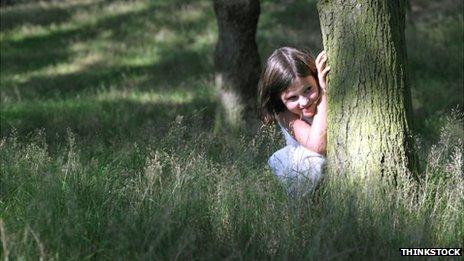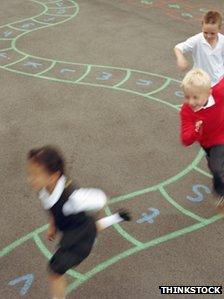Viewpoint: Children have never had it so good
- Published
- comments

Many adults have an idealised view of childhood
Many people have the impression that British children are increasingly troubled, but the truth is different, writes researcher Paul Flatters.
"The internet is creating a generation of lonely children"
"The pursuit of trendy possessions is mentally damaging our children"
"Video games blamed for a surge in rickets in children"
These are all newspaper headlines about childhood from the last few years. And to bring us bang up to date, here is one from a couple of months ago.
"Many people at risk of giving up on children altogether"
Given what we have heard previously, perhaps that should be no surprise.
More of a surprise would be that all of those headlines are wrong. In fact, in many important ways life for children in the UK is getting better - and certainly not getting worse.
So the way that we portray the state of childhood in Britain absolutely makes my blood boil.
First, it offends my sensibilities as a professional social researcher, but it also offends me as a parent. With my wife, I have raised three boys in south London, and I think it is disgraceful that such a range of people - organisations, politicians and journalists - use terrible evidence, or in many cases no evidence at all, to perpetuate negative myths about the state of childhood and family life in the UK today.
I am also dismayed by how readily we as a society choose to believe them.
So, we're told family life is in decline, parents are feckless, career-obsessed, quick to give up on relationships that don't suit them, and they'd much rather stick their kids in front of a DVD or a video than spend time with them.
We're also told that children's brains are damaged by computers and video games, that TV is brainwashing them into becoming materialist consumer stormtroopers of the future, social networking sites are meant to make them more isolated and prevent them from forming normal relationships or real friendships.
We're also told that kids are now more violent, less tolerant than before. They're celebrity obsessed, and apparently more willing to riot than they are to work hard.
My own research paints a very different picture of childhood in modern Britain, and also of how it's evolving.
For example all the best evidence shows that parents now devote more time to caring for their children than ever before, and in particular the current generation of fathers has massively increased the amount of time they spend with their children compared to previous generations.

The influence of technology is often categorised as malign
I've also done quite a bit of research with children themselves, and when we ask them about their role models, teenagers are much more likely to describe their parents, and their respect for them, and for their hard work, than they are to quote footballers or film stars.
The usual portrayal of TV and its impact on childhood ignores its positive effects - there is some fantastic educational output for our kids.
Nor I would argue are our kids passive victims ripe for commercial organisations. They are actually rather savvy, and I think understand very well what commercial organisations are trying to do when they communicate with them, particularly when it comes to engagement online.
Indeed my own research a couple of years ago suggested that the internet can be a force for good for children. Giving them access to broadband internet can improve their educational attainment.
It can also be a good thing in terms of broadening social networks. Rather than narrowing down their friendship groups, it increases them, allowing them to engage with a wider range of people, both virtually and in real life.
When I watch my older son playing World of Warcraft, and discussing with kids in Denmark and the US their various strategies about what they are going to do, I think it is a wonderful, wonderful thing.
So all this leads me to conclude that childhood in the UK, to the extent that it's changing at all, is getting better for the vast majority of children. I am not saying that everything is perfect.
Sadly, some children still live in poverty in the UK and face very serious social problems. Thankfully, though, they are a minority, and I think it does them a real disservice to pretend that every child is facing the same problems.
So why is such a misleading picture being painted? Well first of all I think I have to point the finger at my profession. Quite a lot of bad social research is done, and people draw conclusions from their research that really it is not fair to draw.
Another contributory factor is that the media love a bad news story, and reject good news ones. And of course the plethora of children's charities, competing for headlines and donations, understand this.
Those headlines, for example, were reporting views and research from the likes of Save the Children, the Children's Society and Barnardo's. These charities ratchet up the emotional ante, and I think as they do so their voices become ever more shrill, and reason disappears from the argument.
Academics feel the same pressure - to accentuate the negative. Their next research grant may depend on getting media coverage for their research, which is greater if the story is negative.
So there are real vested interests driving this. I am not a conspiracy theorist, but the system is stacked against positive news about childhood reaching the airwaves and reaching our newspapers.
Other factors are more personal. It is very easy for us as individuals to see or hear the word "change" in the way that childhood is changing and flip that, almost subliminally, into "decline". Changes equals decline. Well it doesn't, it's just different.
People also fear change, and I think from the introduction of the movies, to the talkies, to the wireless, to the TV, to videogames and the internet, every generation fears the corrupting influence of new phenomena on our young.
Finally there is what I call the golden age fallacy, the assumption that there was once a golden age. But think about that. When do you think it was a better time to be a child? The 1970s, the 1950s, or do you go back to the Victorian era? When would there have been a better time to be a child?
But aside from frustrating my professional sensibilities, does this matter? Is it really important that the debate around modern childhood is so distorted?
It does matter, in two ways.

There is a common view that children spend too much time indoors
For the country, policy agendas are constantly distorted by half-truths and downright misinterpretations of reality. The worst example was in 2007, when Unicef published a report suggesting that the UK was at the bottom of a league table of developed countries for childhood wellbeing.
The report created a huge storm of outrage. Politicians of every stripe scrambled to respond.
But if you flick to the technical blurb at the back of the document, the researchers themselves admit that the data was partial, used research conducted differently in different countries, and was quite old. In fact the UK data was so old that it pre-dated many of the policies introduced to improve the situation.
Yet despite its many flaws, the report pointed the policy agenda towards a range of issues that probably do not need tackling. In the process, it deflected attention from the children who really do have difficult lives and badly need help.
This focus on the negative matters for individual families, too. My own children have all lost friends from their homes in south London when the parents, wanting to do the right thing, take them away from the city amid fears of violence and knife crime.
They take them to the countryside, where of course all the statistics show that they are far more likely to be run over in a rural road traffic accident than they ever were to be a victim of knife crime in south London.
So the truth about childhood and family life, as well as other social phenomena like community and crime - is that they are complex. There is some progress, there is the occasional setback, and very often there is no change at all.
But because of this negative myth-making, when social progress is made, I fear that the cards are stacked against us hearing about it. The result is that we get a terribly distorted picture of modern life, and of modern childhood in particular.
So the next time you read or hear about social decline, simply ask yourself what evidence do they have, and then ask whether it is really getting worse.
You may find that things are much better than you thought.
This is based on an edited version of Paul Flatters's Four Thought broadcast on Radio 4.